If your Monstera is turning black, it’s likely due to one of three causes: too much sun, too little water, or pests. Luckily, all three problems are relatively easy to fix.
If your plant is getting too much sun, move it to a shadier spot. If it’s not getting enough water, water it more often. And if pests are the problem, treat the plant with an insecticide.
Causes of Monstera Turning Black
One of the most common reasons for Monstera turning black is too much direct sunlight. The leaves of the plant will start to turn black if they are exposed to too much sunlight. If you notice that your Monstera is turning black, you should move it to a location that gets less direct sunlight.
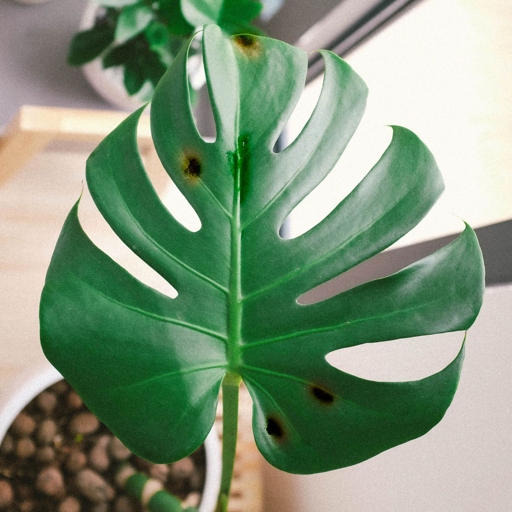
If you notice that your Monstera is turning black, you should check the roots to see if they are wet. If they are, you should let the plant dry out for a few days before watering it again. Another common reason for Monstera turning black is overwatering. The plant will start to turn black if the roots are sitting in water for too long.
Once you know the cause, you can take steps to fix the problem. If you notice that your Monstera is turning black, you should try to identify the cause.
Improper Watering
If you’ve ever had a Monstera, you know that they’re pretty tough plants. But even tough plants can succumb to problems if they’re not cared for properly. One of the most common problems with Monsteras is improper watering.
The leaves will also start to drop off. This is because the roots are sitting in water and they’re not getting the oxygen they need. If you water your Monstera too much, the leaves will start to turn yellow and then brown and wilt.
This is because the plant is stressed and not getting enough water. The leaves will also start to drop off. If you water your Monstera too little, the leaves will start to turn brown and crispy.
Stick your finger in the soil to check. Water the plant until the water runs out of the drainage holes at the bottom of the pot. The best way to water your Monstera is to water it when the top inch or two of soil is dry.
First, try to correct your watering schedule. If the plant is too wet, let the soil dry out before watering again. If the plant is too dry, water it more often. If you think your Monstera is suffering from improper watering, there are a few things you can do to help it recover.
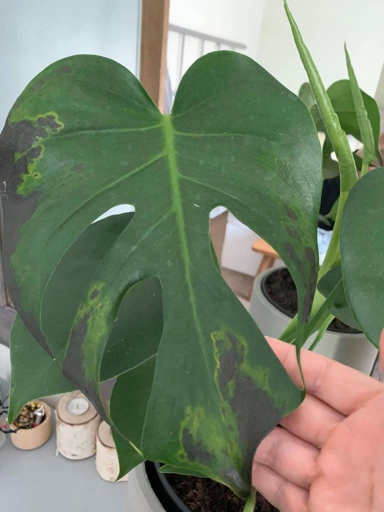
If the pot doesn’t have drainage holes, drill some into the bottom. You can also try to improve the drainage of your pot. If the pot does have drainage holes, make sure they’re not blocked.
Improper watering is a common problem with Monsteras, but it’s usually not fatal. With a little care, your plant should recover quickly.
Water Quality
This is especially true for Monstera plants, which are sensitive to chemicals. Water quality is one of the most important factors in plant health. If your water is high in chlorine, fluoride, or other chemicals, it can cause your plants to turn black.
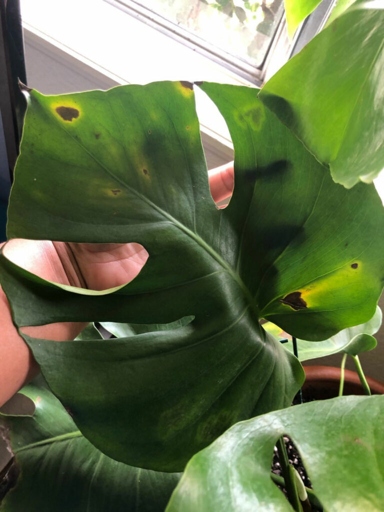
This could be a filtered water pitcher, or a water filter for your home. This should help to prevent your plants from turning black. To fix this problem, you’ll need to find a water source that’s low in chemicals. Once you’ve found a good water source, water your plants with it regularly.
Solution
Monsteras need bright, indirect light to thrive, so if yours is in a low-light spot, it’s not getting the light it needs. Move it to a brighter spot and you should see the black leaves start to green up. If your Monstera is turning black, it’s likely due to a lack of light.
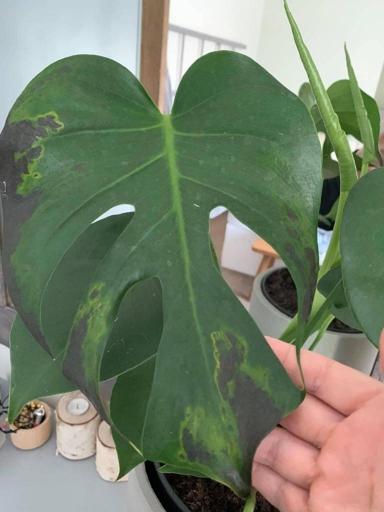
Move it to a spot with more indirect light and you should see the black leaves start to green up. Monsteras need bright, indirect light, so if it’s in a spot that gets direct sunlight, it’s likely getting too much light. If your Monstera is turning black, it could also be due to too much direct sunlight.
Cut back on watering and you should see the black leaves start to green up. Monsteras like to be kept on the drier side, so if you’re watering yours too often, it could be causing the leaves to turn black. If your Monstera is turning black, it could also be due to overwatering.
Overwatering
Monsteras are native to tropical rainforests, so they’re used to getting a lot of water. But too much water can be harmful, causing the leaves to turn black and eventually die. If your Monstera is turning black, it’s likely due to overwatering.
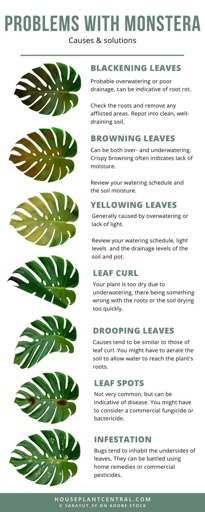
If you think you’re overwatering your Monstera, the first thing to do is cut back on watering. Let the soil dry out completely between waterings, and don’t water more than once a week. You may also need to repot your plant in a pot with better drainage.
If you’re not sure whether you’re overwatering or not, check the leaves for signs of water stress. If they’re wilting or turning yellow, that’s a good indication that you’re giving them too much water.
Once you’ve fixed the problem, your Monstera should start to recover and the leaves should return to their normal color.
Solution
If your Monstera leaves are turning black, it’s important to identify the cause so you can take the appropriate steps to fix the problem.
One common cause of black leaves on Monsteras is too much direct sunlight. If your plant is getting too much sun, you’ll need to move it to a shadier spot.
Another possible cause is lack of humidity. You can increase the humidity by misting the leaves or setting the plant on a tray of pebbles and water. If the air around your plant is too dry, the leaves will start to turn black.
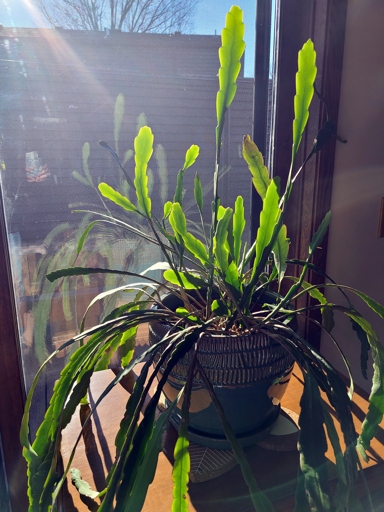
If you can’t figure out the cause of the black leaves, it’s best to take your plant to a professional for help.
Dehydration
The best way to prevent dehydration is to water your plant regularly and deeply. Dehydration can cause the leaves of your plant to turn black and eventually drop off. Dehydration is one of the most common problems that can affect Monstera plants. However, if your plant is already dehydrated, you can try to revive it by giving it a good soaking in lukewarm water.
Solution
If the plant is infested with pests, the leaves may turn black. Another solution is to check the plant for pests. Finally, you can try to increase the humidity around the plant. If the air is too dry, the leaves may turn black. If the plant is not getting enough light, the leaves may turn black. One potential solution to your black-leafed Monstera is to increase the amount of light that the plant is getting.
Dry Soil
There are a few things that you can do to fix this problem. Dry soil is one of the most common problems that gardeners face. If your soil is too dry, it can cause your plants to wilt, your flowers to droop, and your vegetables to shrivel.
This can be done by adding compost or mulch to your garden. This will help to hold moisture in the soil and will also provide nutrients for your plants. One of the easiest ways to fix dry soil is to add organic matter.
You may also need to water more frequently if the weather is hot and dry. Another way to fix dry soil is to water your plants more often. Make sure that you water deeply so that the water can reach the roots of the plants.
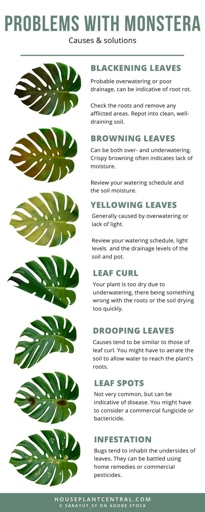
This is a product that you can add to your soil that will help to hold moisture. If you have tried these methods and your soil is still dry, you may need to consider using a soil amendment. There are many different types of soil amendments available, so be sure to ask your local nursery or garden center for advice on which one would be best for your garden.
Solution
If your Monstera is turning black, there are a few possible causes. If you think either of these might be the problem, try moving your plant to a spot with more indirect light and increasing the humidity around it. The most common is too much direct sunlight, which can scorch the leaves. Another possibility is a lack of humidity, which can cause the leaves to turn brown and then black.
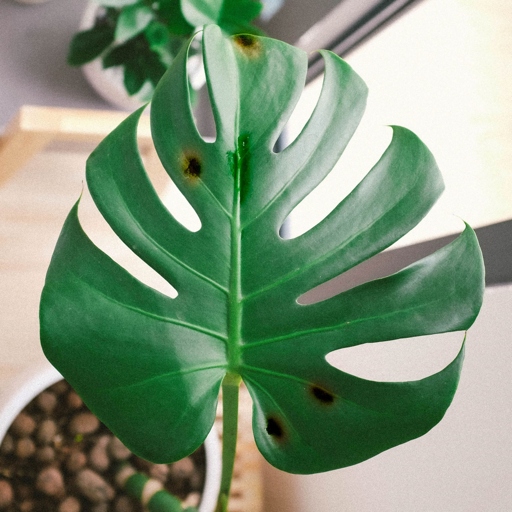
If you suspect this is the case, take your plant to a local nursery or garden center for help. If your Monstera is still turning black, it could be a sign of a more serious problem like a fungal infection or root rot.
Temperature Issues – Cold Temperatures and Sunburns
When it comes to temperature, both cold and hot extremes can be harmful to your Monstera. In cold temperatures, your plant can suffer from frostbite, which will cause the leaves to turn black and eventually die. On the other hand, too much sun can also cause your Monstera leaves to turn black. If you notice your plant starting to turn black, move it to a shadier spot and make sure to protect it from the hot sun. This is called sunburn, and it can be just as damaging as frostbite. To prevent this, make sure to keep your plant in a warm, protected area during the winter months.
Cold Stress
This is known as cold stress, and it can be caused by a number of factors, including exposure to cold temperatures, drought, or even too much sun. When a plant is under stress, it will often produce darker leaves as a way to protect itself. Stress can manifest in many ways, and one of the most common is through changes in leaf color.
If you notice your Monstera leaves turning black, it’s important to take a closer look at the plant to determine the cause. However, if the leaves are black all over, it could be a sign of a more serious problem, like a fungal infection. If the leaves are only black on the tips, it’s likely due to cold damage.
Once you’ve determined the cause of the black leaves, you can take steps to fix the problem. If the leaves are only black on the tips, you can trim them back to encourage new growth. If the leaves are black all over, you’ll need to take more drastic measures, like removing the affected leaves and treating the plant with a fungicide.
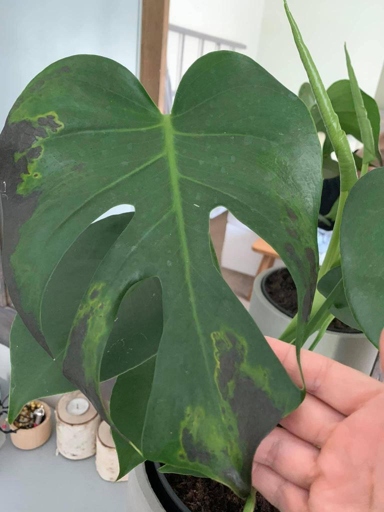
By taking action to address the problem, you can help your plant recover and prevent further stress in the future. No matter the cause, black leaves are a sure sign that your Monstera is under stress.
Solution
Monsteras need to be fertilized about once a month to ensure they’re getting the nutrients they need to stay healthy. Monsteras need to be watered regularly, about once a week, to prevent the leaves from drying out and turning black. Monsteras prefer bright, indirect light, so if it’s getting too much sun, the leaves will start to turn brown and then black. Second, it could be due to a lack of water. If your Monstera is turning black, there are a few potential causes. First, it could be due to too much direct sunlight. Finally, it could be due to a lack of nutrients.
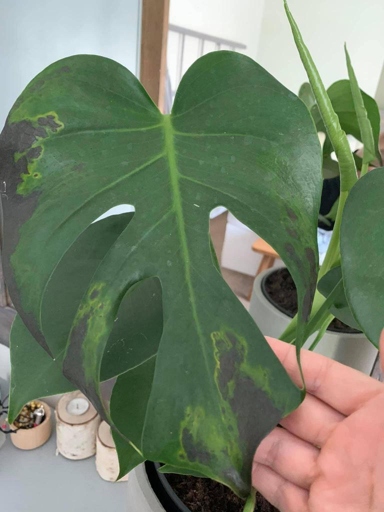
By taking these steps, you should be able to get your Monstera back to its healthy, green self in no time! Third, fertilize it more often. If your Monstera is turning black, there are a few things you can do to fix it. Second, water it more frequently. First, move it to a spot with less direct sunlight.
Heat Stress – Sunburn
Heat stress can also cause the leaves to turn yellow or brown and drop off. This is a sign that the plant is suffering from sunburn and needs to be moved to a shadier spot. Heat stress and sunburn are two of the most common problems that can affect your Monstera. If your plant is exposed to too much direct sunlight, the leaves can start to turn black. To prevent this, make sure to water your Monstera regularly and mist the leaves with water on hot days. If you think your plant is suffering from heat stress, move it to a cooler location and out of direct sunlight.
Solution
If your Monstera is turning black, it’s likely due to one of three causes: too much sun, too little water, or pests. Luckily, all three problems are relatively easy to fix.
If it’s not getting enough water, water it more frequently. And if pests are the problem, treat the plant with an insecticide. If your plant is getting too much sun, move it to a shadier spot.
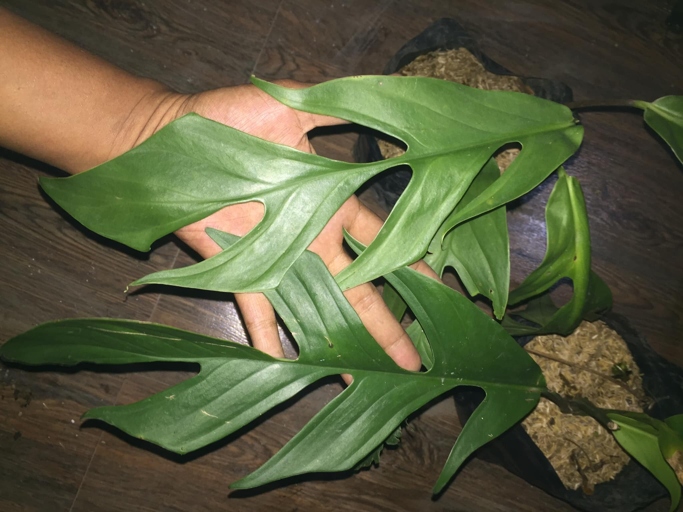
If your Monstera plant is turning black, it is likely due to too much direct sunlight or too much water. Move your plant to a shadier spot and/or reduce watering to help fix the problem.
With a little care, your Monstera will be back to its green self in no time.
Not Enough Sunlight
Monsteras need bright, indirect sunlight to thrive, so if yours is in a low-light spot, it may start to turn black. If your Monstera is turning black, it’s likely because it’s not getting enough sunlight.
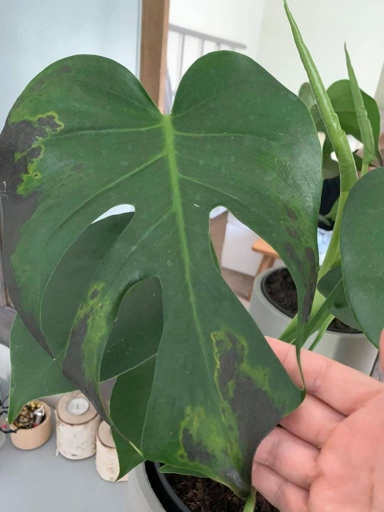
So find a happy medium – a spot where it will get bright, indirect sunlight. If it’s getting too much direct sunlight, however, it may start to turn brown. To fix the problem, move your Monstera to a brighter spot.
In this case, you’ll need to consult a plant expert to diagnose the problem and find a solution. If your Monstera is still turning black, it may be a sign of a more serious problem, like a nutrient deficiency.
Solution
Treat the plant with a fungicide and keep an eye on it for further signs of distress. If it’s not getting enough water, water it more frequently. If your Monstera is turning black, it’s likely due to one of two reasons: too much sun or too little water. If your plant is in direct sunlight, move it to a shadier spot. If the leaves are still black after you’ve adjusted the light and watering, it’s possible the plant is suffering from a fungal infection.
Humidity problems
If you notice your Monstera leaves turning black, it’s likely due to one of two reasons: either the plant is getting too much sun, or the humidity is too low.
If the leaves are still turning black, the problem may be due to low humidity. If your Monstera is in a spot that gets a lot of direct sunlight, move it to a location with indirect light.
You can also run a humidifier in the room where your plant is located. To increase the humidity around your Monstera, try misting the leaves with water or placing the pot on a tray of pebbles and water.
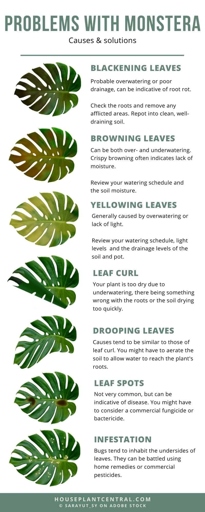
If you suspect that low humidity is the problem, be sure to increase the humidity gradually. Sudden changes in humidity can cause the leaves of your Monstera to turn brown and drop off.
Low Humidity
If you notice your Monstera leaves turning black, it’s likely due to low humidity. If the air in your home is too dry, your plant will start to suffer. Monsteras are native to tropical rainforests, so they thrive in high humidity environments.
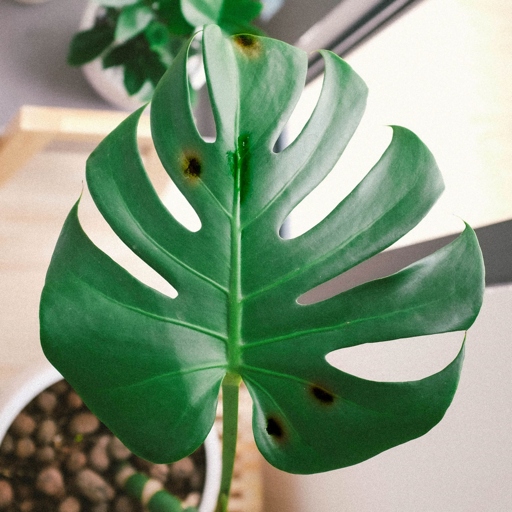
With a little extra care, you can get your Monstera back to its healthy, green self in no time. You should also make sure you’re not over-watering your plant, as this can also lead to leaf discoloration. To increase the humidity around your Monstera, try grouping it with other plants, running a humidifier, or placing it on a pebble tray.
Solution
If your Monstera is turning black, it’s likely due to a lack of light. Monsteras need bright, indirect light to thrive, and if they don’t get enough, their leaves will start to turn black.
If it’s getting direct sunlight, try filtering the light with a sheer curtain. If you can’t move your plant, you can try increasing the light with a grow light. To fix the problem, move your Monstera to a brighter spot.
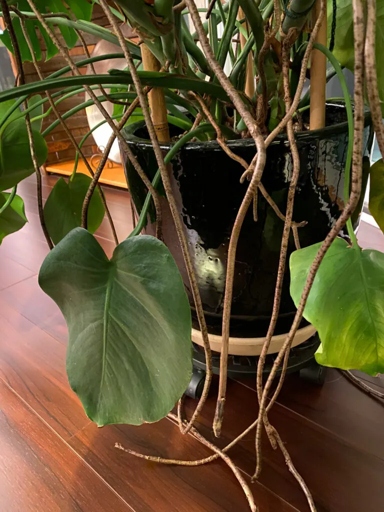
If the leaves are still black, they may be damaged beyond repair and you’ll need to cut them off. Once you’ve increased the light, your Monstera should start to green up again.
Misting
Misting the leaves with water will help to keep them healthy and prevent them from turning black. Misting is one of the most important parts of caring for a Monstera plant. The leaves of the plant are very sensitive to dryness and will start to turn black if they are not kept moist.
Misting the leaves will help to keep them hydrated and prevent them from turning black. It is important to mist the leaves of the Monstera plant regularly, especially if the air in your home is dry.
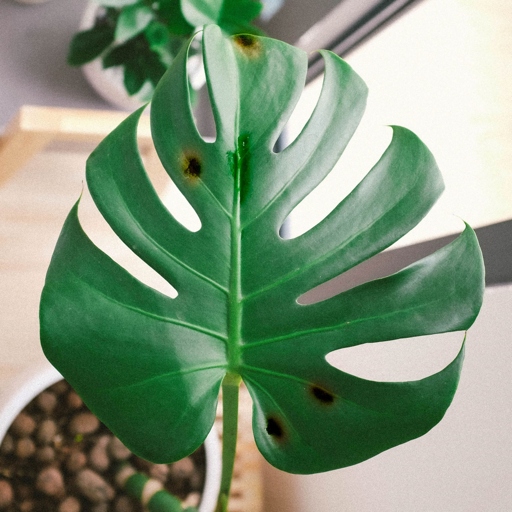
This will help to hydrate the leaves and prevent further damage. If you notice that the leaves of your Monstera plant are starting to turn black, mist them immediately with water.
Solution
If you notice your Monstera leaves turning black, it is most likely due to too much direct sunlight. Monsteras prefer indirect sunlight, so if you notice the leaves turning black, move your plant to a location with less direct sunlight.
If the leaves are turning black and mushy, it is a sign that the plant is getting too much water. Allow the soil to dry out slightly between watering and make sure the pot has drainage holes to allow excess water to escape. Another possible cause of black leaves on a Monstera is too much water. Monsteras like to be kept moist, but not soggy.
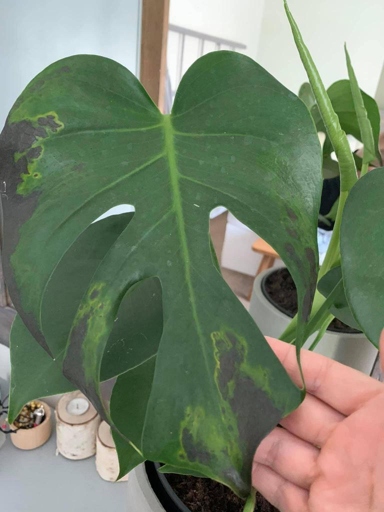
If you think your Monstera is getting too much or too little water, check the soil before watering. If the soil is still moist, wait a few days before watering again. If it is dry several inches down, it is time to water.
If you notice the leaves turning black, stop fertilizing and allow the plant to rest. Fertilize monthly during the growing season, using a balanced fertilizer diluted to half strength. Over-fertilizing can also cause black leaves on a Monstera.
Inadequate Fertilization
If your plant is still turning black, increase the frequency of fertilization. If your Monstera is turning black, it’s likely due to inadequate fertilization. Fertilize your Monstera every two weeks with a balanced fertilizer during the growing season, and monthly during the winter.
Solution
If your Monstera is turning black, it’s likely due to a lack of light. Monsteras need bright, indirect light to thrive, and if they don’t get enough, their leaves will start to turn black.
If it’s getting direct sunlight, try filtered light instead. You can also increase the humidity around your plant by misting it regularly or setting it on a pebble tray. To fix the problem, move your Monstera to a brighter spot.
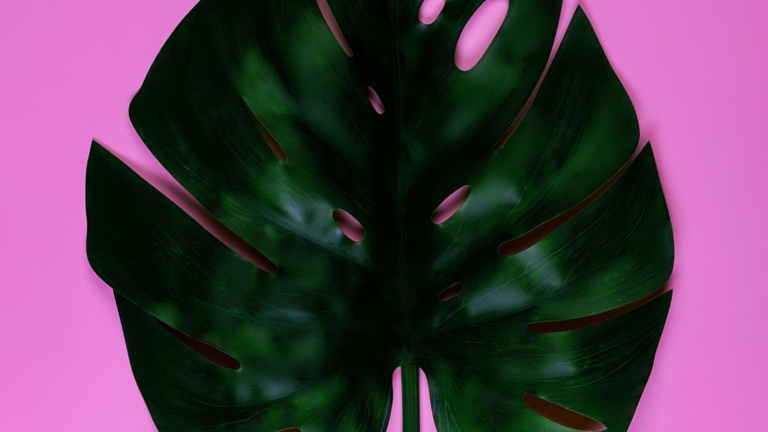
With a little extra care, your Monstera will soon be back to its healthy, green self.
Diseases
The most common diseases that cause black leaves on Monsteras are Anthracnose, Botrytis, and Cercospora. If your Monstera leaves are turning black, it is likely due to one of several diseases. These diseases can be caused by fungi, bacteria, or viruses, and can be spread by insects or through contaminated soil.
Anthracnose is a fungal disease that affects the leaves, stems, and fruits of Monsteras. Anthracnose can be controlled with fungicides, but it is important to catch it early. It is characterized by black or brown lesions on the leaves, which can eventually lead to leaf death.
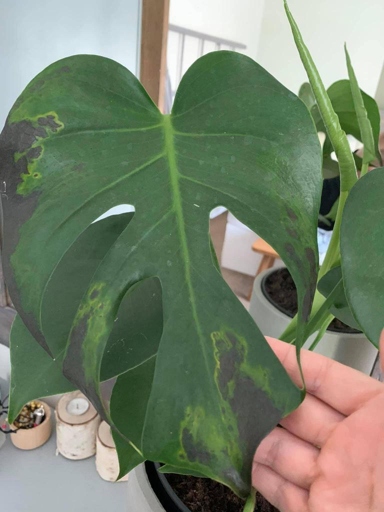
It is characterized by gray or brown lesions on the leaves, which can eventually lead to leaf death. Botrytis can be controlled with fungicides, but it is important to catch it early. Botrytis is a fungal disease that affects the flowers and leaves of Monsteras.
It is characterized by small, black lesions on the leaves, which can eventually lead to leaf death. Cercospora is a fungal disease that affects the leaves of Monsteras. Cercospora can be controlled with fungicides, but it is important to catch it early.
Root and Stem Rot
Root and stem rot is a serious problem for Monstera plants. The best way to prevent root and stem rot is to make sure that the soil is well drained. If the plant is already affected by root and stem rot, the best course of action is to remove the affected parts of the plant. The roots of the plant will become waterlogged and will start to rot. The cause of root and stem rot is usually a lack of drainage in the soil. The leaves of the plant will turn black and the plant will eventually die. The plant should also be watered regularly. The stem of the plant will also start to rot.
Solutions
Here are a few possible solutions: If your Monstera is turning black, it could be due to a number of reasons.
Check the light conditions. If it’s too dark, the leaves will start to turn black. 1. Monsteras need bright, indirect light.
Check the watering. Overwatering can cause the leaves to turn black. Monsteras like to be kept moist, but not soggy. 2.
Monsteras need well-draining soil. 3. Check the soil. If the soil is too dense, the water can’t drain properly and the leaves will turn black.
Check for pests. Mealybugs, scale, and spider mites are all common pests that can cause Monstera leaves to turn black. 4. If you see any pests, treat them immediately.
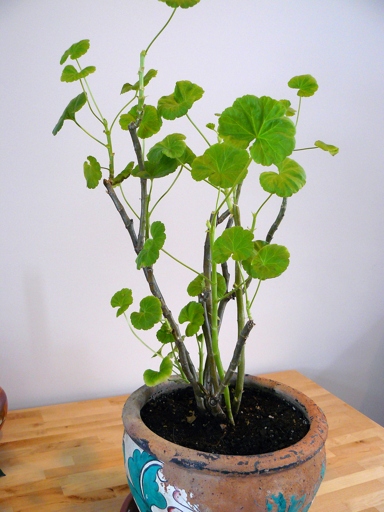
Some diseases, like black spot, can cause Monstera leaves to turn black. Check for diseases. If you suspect a disease, consult with a plant expert. 5.
By troubleshooting the problem, you should be able to figure out what’s causing the black leaves and fix it. If your Monstera is turning black, don’t panic! There are a number of possible solutions.
Anthracnose
The disease is characterized by black or brown spots on the leaves, stems, and fruits of the plant. Anthracnose is most commonly caused by the fungi Colletotrichum or Gloeosporium. The spots may be raised or sunken, and they can eventually lead to the death of the affected plant parts. Anthracnose is a fungal disease that can affect many different types of plants, including Monstera. These fungi thrive in warm, wet conditions, and they can spread quickly through an infected plant.
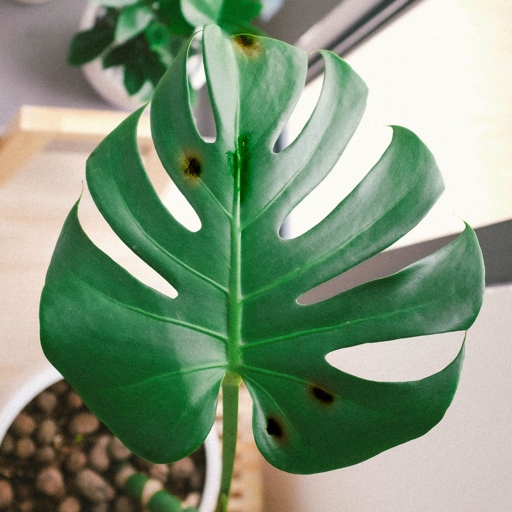
Water the plant at the base, and make sure the leaves are dry before nightfall. Avoid overhead watering, which can promote fungal growth. You can also try using a fungicide to prevent or treat anthracnose. To prevent anthracnose, it is important to keep your Monstera plant healthy and free of stress. If you see any black or brown spots on your plant, remove the affected leaves or stems immediately.
Solution
If your Monstera is turning black, it’s likely due to one of three causes: too much sun, too little water, or pests. Luckily, all three of these problems have relatively easy solutions.
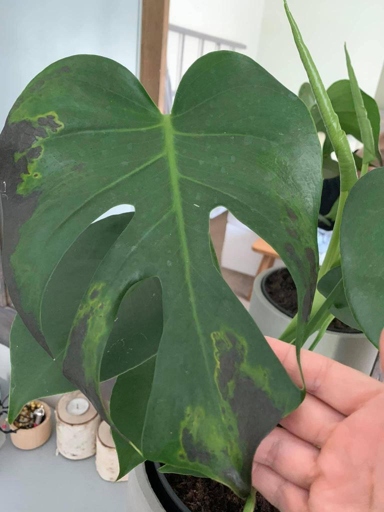
If your Monstera is turning black due to too much sun, the best solution is to move it to a shadier spot. If it’s turning black due to too little water, you’ll need to increase the frequency of your watering. And if pests are to blame, you’ll need to treat your plant with an insecticide.
Whichever the cause, if your Monstera is turning black, there is a solution. With a little bit of care, you can get your plant back to its healthy, green self in no time.
Pests
Inspect it regularly for signs of pests and remove them promptly. You can also try to prevent pests by keeping your plant clean and healthy. Pests can cause leaves to turn black by sucking the sap out of the plant, which can lead to leaf death. To get rid of pests, start by inspecting your plant for signs of them. Look for small holes in the leaves or for insects crawling on the plant. If you see any pests, remove them by hand or with a pesticide. If your Monstera is turning black, it could be due to pests.
Spider Mites
Spider mites are difficult to see with the naked eye, but you may notice webbing or small, yellowish spots on your plant leaves. If left unchecked, spider mites can cause the leaves of your Monstera to turn black and eventually die. These pests are especially prevalent in warm, dry conditions, so be extra vigilant in summer months. Spider mites are a type of arachnid that feeds on plants, and they can cause serious damage to your Monstera.
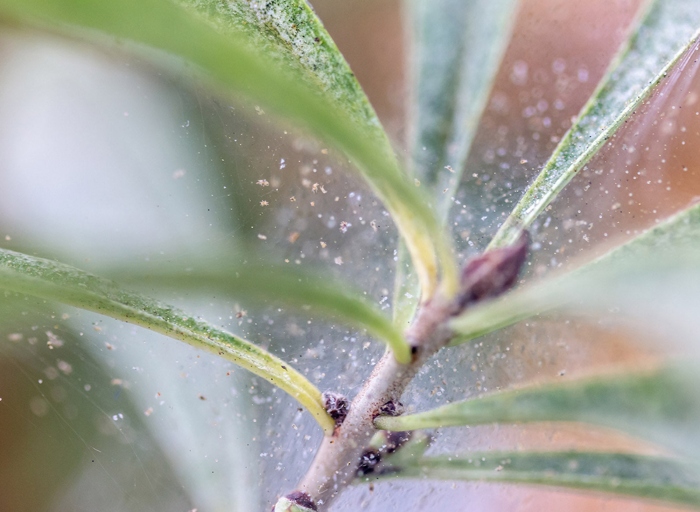
To prevent spider mites from returning, keep your plant in a well-ventilated, humid environment and regularly inspect it for signs of pests. Then, apply a miticide or insecticide according to the directions on the label. You may need to repeat this process several times to fully eliminate the spider mite infestation. To get rid of spider mites, start by spraying your plant with water to dislodge them.
Thrips
Thrips are tiny, winged insects that are often mistaken for black pepper. They are a common problem for indoor and outdoor plants, and can cause serious damage if left unchecked. In severe cases, thrips can cause leaves to drop off entirely. Thrips feed on plant sap, and their feeding can cause leaves to turn black or brown.
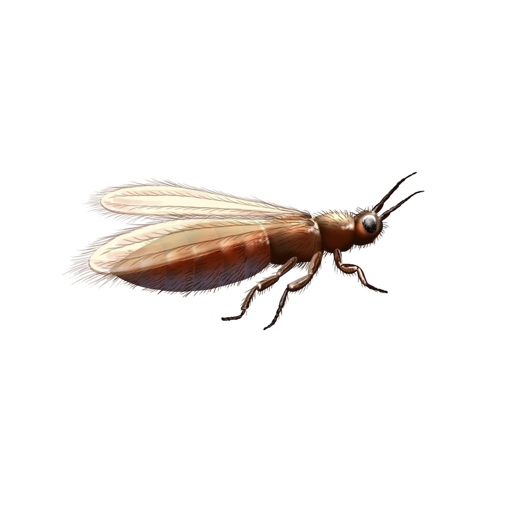
Insecticidal soap and neem oil are effective treatments, but must be applied carefully to avoid harming the plant. You can also try using yellow sticky traps to catch thrips before they have a chance to feed. If you have a serious infestation, you may need to consult a professional pest control company. There are several ways to get rid of thrips.
Solutions
Luckily, all of these problems can be easily fixed. If your Monstera is turning black, it’s likely due to one of three causes: too much direct sunlight, too much water, or too much fertilizer.
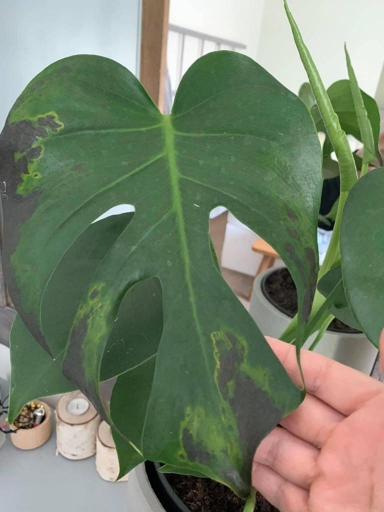
If it’s getting too much water, let the soil dry out between watering. If your Monstera is turning black due to too much direct sunlight, simply move it to a shadier spot. With a little TLC, your Monstera should be back to its green self in no time. And if you think it’s getting too much fertilizer, cut back on feeding it.
Physical Damage
This can be caused by a number of things, including sunburn, freezing temperatures, or even physical trauma. If your Monstera is turning black, it’s likely due to physical damage.
If you suspect that physical damage is the cause of your Monstera’s black leaves, the first step is to assess the extent of the damage. If only a few leaves are affected, you can try trimming them off and see if the plant recovers. However, if the damage is more widespread, it’s best to consult with a professional.
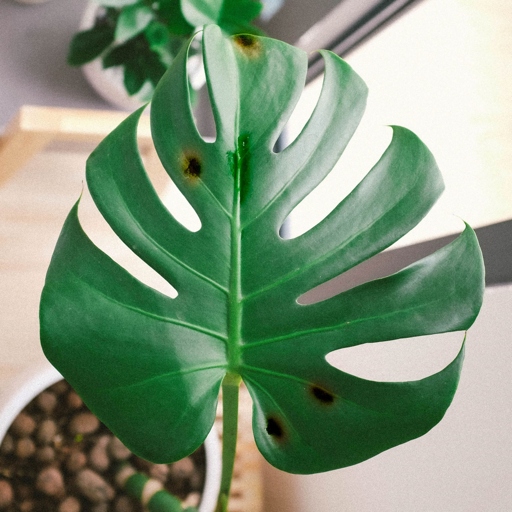
With proper care and attention, your Monstera can bounce back and continue to thrive. Physical damage can be difficult to fix, but it’s not impossible.
Solutions
If your Monstera is turning black, it’s likely due to one of three causes: too much sun, too much water, or pests. Luckily, all of these problems can be easily fixed with a little bit of effort.
Monsteras need bright, indirect light to thrive, so if it’s getting too much sun, it will start to turn black. If your Monstera is turning black due to too much sun, the solution is simple: move it to a shadier spot.
Monsteras are native to tropical rainforests, so they’re used to getting a lot of water. However, too much water can cause the leaves to turn black. If your Monstera is turning black due to too much water, the solution is also simple: let the soil dry out completely between waterings.
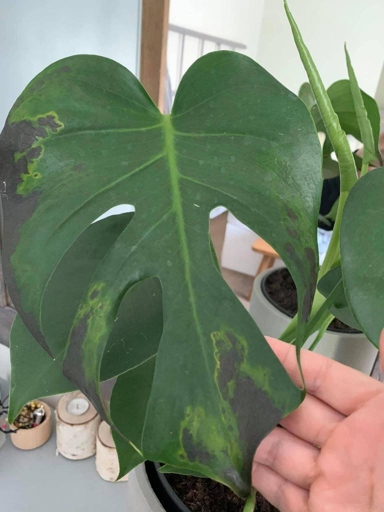
If your Monstera is turning black due to pests, the solution is a little more difficult. You’ll need to inspect the plant carefully to identify the pests, and then treat the plant accordingly. Common pests that can cause blackening of the leaves include mealybugs, spider mites, and scale.
Should I Remove Leaves with Black Spots on Them?
The best way to control leaf spot is to remove affected leaves and dispose of them. Leaf spot is a common problem in gardens, and it can be difficult to control. Black spots on leaves are usually caused by a fungal disease called leaf spot. Leaves with black spots can be unsightly, but they’re usually not a cause for alarm. If the leaf spot is severe, you may need to use a fungicide.
Final Words
If you notice your Monstera leaves turning black, check for these other causes first: When your Monstera leaves start to turn black, it can be alarming. While it is true that black leaves are often a sign of a dying plant, there are a few other possible causes.
Be sure to let the soil dry out completely between waterings. If the soil is too wet, the leaves will start to turn black. 1. Overwatering: Monsteras are very sensitive to overwatering.
Sunburn: Monsteras need bright, indirect light. Move your plant to a shadier spot. If they are placed in direct sunlight, the leaves will start to turn black. 2.
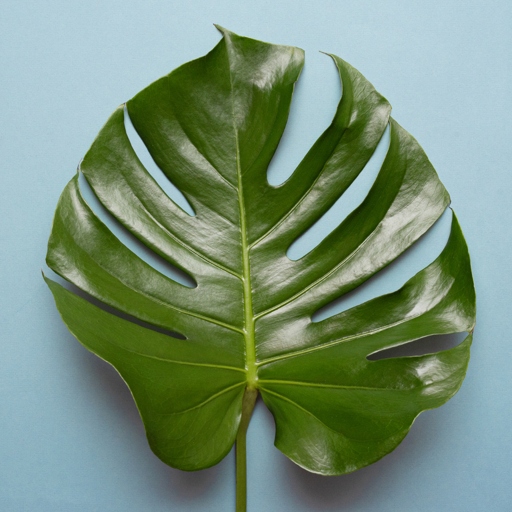
3. Inspect your plant carefully and treat with an appropriate insecticide if necessary. Pests: Aphids, mealybugs, and other pests can cause the leaves of your Monstera to turn black.
There is no way to save a plant that is already dying, so you will need to start over with a new one. If you can rule out these other causes, then it is likely that your Monstera is simply dying.
Frequently Asked Questions
1. Why is my Monstera turning black?
There are several reasons why your Monstera could be turning black. The most common reason is due to too much direct sunlight. Monsteras need bright, indirect light to thrive, and too much direct sunlight can cause the leaves to turn black. Another possible reason is lack of water. Monsteras need to be watered regularly, and not allowing the soil to dry out completely can cause the leaves to turn black.
2. What are the other possible causes of my Monstera turning black?
Other possible causes of black leaves on a Monstera include nutrient deficiencies, pests, or diseases. If your plant is not getting enough nitrogen, magnesium, or manganese, the leaves may turn black. If your plant is infested with pests, such as mealybugs, aphids, or scale, they can also cause the leaves to turn black. And finally, if your plant has a disease, such as bacterial leaf spot or fungal leaf spot, the leaves may turn black.
3. How can I fix the problem?
If your Monstera is turning black due to too much direct sunlight, simply move it to a location with brighter, indirect light. If the problem is lack of water, make sure to water your plant regularly and allow the soil to dry out between waterings. If the problem is due to a nutrient deficiency, you can fertilize your plant with a balanced fertilizer. If your plant is infested with pests, you can treat it with an insecticidal soap or horticultural oil. And finally, if your plant has a disease, you can treat it with a fungicide.
4. Will the black leaves fall off?
In most cases, yes. If the leaves are turning black due to too much direct sunlight, they will usually fall off on their own. If the leaves are turning black due to lack of water, they will also usually fall off. If the leaves are turning black due to a nutrient deficiency, they may fall off or they may turn yellow and then fall off. If the leaves are turning black due to pests, they may fall off or they may be covered in the pests. And finally, if the leaves are turning black due to a disease, they may fall off or they may be covered in the disease.
5. Will the black leaves grow back?
It depends. If the leaves are turning black due to too much direct sunlight, they will usually grow back once the plant is moved to a location with brighter, indirect light. If the leaves are turning black due to lack of water, they will also usually grow back once the plant is watered regularly. If the leaves are turning black due to a nutrient deficiency, they may grow back or they may not. If the leaves are turning black due to pests, they may grow back or they may not. And finally, if the leaves are turning black due to a disease, they may grow back or they may not.
Final thoughts
If your Monstera leaves are turning black, it is likely due to one of three causes: too much direct sunlight, not enough humidity, or a nutrient deficiency. The good news is that all of these problems are easily fixable. Simply move your plant to a spot with less direct sunlight, increase the humidity around it, or feed it a balanced fertilizer. With a little TLC, your Monstera will be back to its lush, green self in no time.
